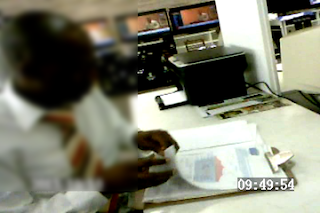I know lots of secrets. Really juicy ones.
But I’m not going to tell you what they are. That’s because they’re, yes, you guessed it, secrets. That’s what a secret is, something you don’t tell people.
The trouble is that some people can’t keep secrets. Either because of some psychological disorder or because they’re just blabbermouths they can’t help tell you things they’re not meant to tell you. We’ve all had an experience when someone starts a sentence with “I probably should tell you this, but…” and then shares some gossip about who’s seeing who or who’s about to be fired. Alternatively, they end their disclosure with “I probably shouldn’t have told you that, you won’t tell anyone else, will you?”
We all know, or we should, that while these people are fun to spend time with, they’re also the people with whom our secrets are unsafe. If they’re betraying other people’s trust, why will they treat ours any better?
So how would you feel if your bank behaved like one of these people? Or the furniture store from which you recently bought some goods?
Surely no company would behave like that, would they?
Yes, they most certainly do.
A couple of years ago we went undercover to a number of furniture store in Gaborone to investigate how well (or badly) they treated potential customers. This had been prompted by a survey we’d done when we asked people who had bought things on hire purchase if they’d been allowed to read the hire purchase contract before making a decision. Almost everyone said they hadn’t been allowed to see the contract. Some were told they could see it when they signed it, others were told it would be posted to them, some were told they could see it when the goods were delivered. One was even told they couldn’t get a copy even after the delivery because “it’s confidential”.
So we tried our luck. Wearing hidden cameras, we went to a variety of stores and asked the staff if we could see a copy of their HP contract. We had mixed luck. Some told us that they didn’t have copies right now (but I bet they would have done if they thought we were really going to spend some money), others said we could see them later, when we were ready to sign them. To be fair, a couple did give us copies to take away to read at leisure. However the most memorable was the store whose sales representative told us that they didn’t have any blank copies right now but would we like to have a copy of the last customer’s agreement? Off he went and came back with the bottom copy from a multi-part form that he gave us to take away. We still have it stored safely in case the customer ever wants it back.
This agreement shows the customer’s full name, postal and residential address, phone numbers, Omang and a full description of the details of the items he bought. Luckily I wasn’t in the mood to rob his house.
Of course you’d be correct to say that nothing that confidential was disclosed. There’s not much I can do to abuse this guy, is there?
But consider this. What if he’s my business rival? Or my romantic rival? What if I used the details I’d been given to check his credit history?
More importantly I think privacy is a human right. The philosopher AC Grayling said that privacy “is an indispensable adjunct of the minimum that individuals require for a chance to build good lives” and that “it is crucial for personal autonomy and psychological well-being”.
Obviously privacy, like free speech, isn’t absolute. Just as we don’t have the right to “shout fire in a crowded theater when there is no fire” we don’t always have a right to privacy. This right can be removed by the courts from criminals under surveillance but those of us who are law-abiding have a right to live our lives privately. Section 3 of the Constitution even makes the privacy of our homes one of our “fundamental rights”.
So what the furniture store did was wrong. It was also rather stupid. When we mentioned this event on a television program a few weeks later they went into a tailspin, making up excuses about why they behaved so badly. They knew they’d done something silly, something that customers wouldn’t like.
So what about banks? Would they do something as silly?
No, they wouldn’t, mainly because they would be punished by the Bank of Botswana which regulates the banking industry in Botswana. But that doesn’t stop them doing some strange things. One of the banks, one of the bigger ones, does something I still don’t understand. When you sign up for their cellphone banking or internet banking services they ask you to go to their web site and enter some details. One of these details is your ATM PIN.
I find that strange. The advice we give everyone and that banks also give, is never, ever to give your PIN to anyone. Never give it to a stranger, not even a relative, and certainly not to anyone from the bank. We’ll never ask you for your PIN, that’s what they tell us. So why does this bank then break this rule, a rule I though was absolutely never to be broken?
I don’t know the answer but it’s a real risk. Crooks go to extreme lengths to get our PINs and this is a great opportunity for them to steal our PIN in a “phishing” attack when they create a fake version of a bank’s online banking service.
My view is that your PIN should be a secret known only to you and the ATM. Anything else is a major breach of privacy. Don’t ever give your PIN to anyone, certainly not a web site.


No comments:
Post a Comment